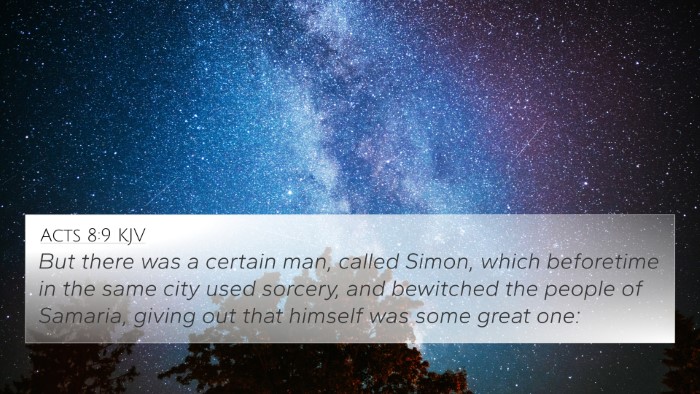Understanding Acts 5:36
Bible Verse: Acts 5:36
"For before these days rose up Theudas, boasting himself to be somebody; to whom a number of men, about four hundred, joined themselves: who was slain; and all, as many as obeyed him, were scattered, and brought to nought."
Summary of Meaning
The context of Acts 5:36 involves Gamaliel, a respected Pharisee, giving counsel to the Sanhedrin concerning the apostles, who were preaching the gospel. Gamaliel refers to historical figures like Theudas to illustrate the futility of rebelling against God's purposes. This verse serves to show how movements led by self-proclaimed leaders often come to nothing when they lack divine backing.
Commentary Insights
- Matthew Henry: Henry emphasizes the transient nature of Theudas' movement, underscoring that those who turn away from God's truth will ultimately fail. He reflects on how many today may also be drawn to charismatic leaders but should instead focus on the Gospel.
- Albert Barnes: Barnes points out that Theudas is an example of false leaders who attract followers through personal charisma rather than divine authority. He notes the historical significance of the event as a warning against the rejection of apostolic teaching.
- Adam Clarke: Clarke interprets the actions of Theudas and his followers as a demonstration of misplaced faith in human leaders. He mentions that while Theudas claimed great things, he also fell victim to his ambitions, leaving his followers disillusioned and scattered.
Cross References
Acts 5:36 can be connected to various scripture references, showcasing its theme of false prophets and movements:
- Acts 5:37 - "After this man rose up Judas of Galilee in the days of the taxing..." - Another example of a false leader.
- Jeremiah 23:21-22 - "I have not sent these prophets, yet they ran: I have not spoken to them, yet they prophesied." - Warning against false prophecies.
- Matthew 24:11 - "And many false prophets shall rise, and shall deceive many." - Echoing the risk of following false leaders.
- 2 Peter 2:1 - "But there were false prophets also among the people, even as there shall be false teachers among you..." - A caution against the emergence of false teachers.
- Luke 21:8 - "And he said, Take heed that ye be not deceived: for many shall come in my name, saying, I am Christ; and the time draweth near: go ye not therefore after them." - A direct warning about deception in spiritual matters.
- 1 John 4:1 - "Beloved, believe not every spirit, but try the spirits whether they are of God..." - Encouragement to discern truth from falsehood.
- Acts 13:6 - "And when they had gone through the isle unto Paphos, they found a certain sorcerer, a false prophet, a Jew, whose name was Barjesus." - Further insight into the presence of false prophets in the early church.
Thematic Connections
The overarching theme in Acts 5:36 relates to the danger of following individuals who elevate themselves above the truth of God. This verse can be positioned in the broader narrative of the Bible that warns against charismatic leaders who lack genuine divine authority.
Tools for Cross-Referencing
Studying the connections between Bible verses can be enhanced by various tools such as:
- Bible concordances which help locate specific themes or concepts.
- Cross-reference guides that provide clarity on how verses relate.
- Chain references that link verse ideas across different books.
- Comprehensive cross-reference materials for deeper study.
How to Use Bible Cross-References
Engaging with cross-references can deepen understanding through:
- Identifying connections between Old and New Testaments.
- Providing a comparative study of narratives in varying Gospels.
- Exploring biblical themes through connected verses.
- Developing sermon preparation based on linked scriptures.
Conclusion
Acts 5:36 serves as a poignant reminder of the pitfalls of following human leaders disconnected from God's true guidance. By utilizing cross-referencing tools and insights from various commentators, readers are encouraged to dig deeper into the scripture, ensuring they anchor their faith on the everlasting truths found within the Bible's sacred texts.














